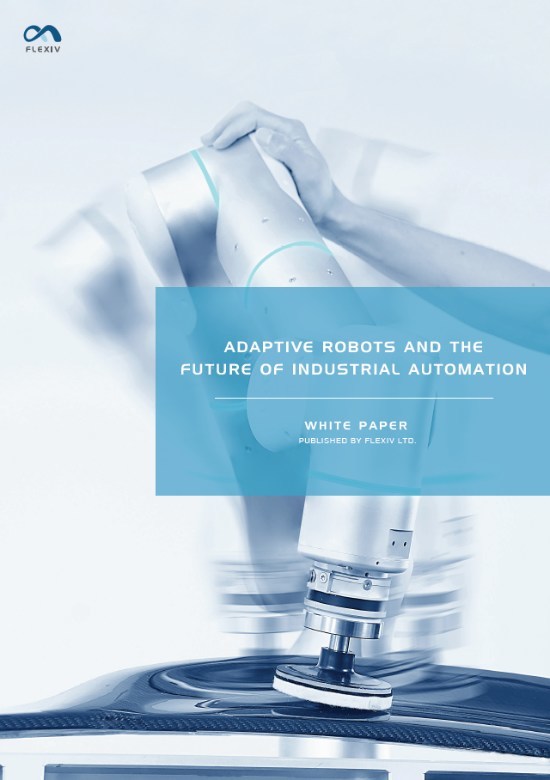Flexiv Releases White Paper: Adaptive Robots and the Future of Industrial Automation
Flexiv Ltd., creator of the world’s first adaptive robotic arm combining direct force control with advanced AI, today released an official white paper that both reviews the status quo of industrial robots and investigates the potential impact of new technologies.
In the white paper, the robotics and AI firm forecasts a future in which adaptive robots will revolutionize the world of industrial automation.

The white paper, titled ‘Adaptive Robots and the Future of Industrial Automation’, outlines the progress from the first industrial robots of the 1990s, ideal for tasks involving repeated trajectories, to that of the collaborative robots (or ‘cobot’), integrated with safety features able to protect humans from hazards in the environment.
These days it is commonplace to see traditional robots and cobots operating in tandem in manufacturing plants. However, both kinds of robots have challenges to handle sophisticated tasks that require fine manipulation with hand-eye coordination, or to adapt to non-ideal conditions commonly existing in manufacturing lines. They also rely on the advanced programming skills of engineers to ‘learn’ new tasks, and extensive time to fine-tune motion trajectories to ensure quality consistency. All of which impact negatively on the flexibility, costs and overall efficiency of manufacturing.
Read More: Merkle Releases First Customer Engagement Report as Part of New Quarterly Research Series
Flexiv says that to accomplish tasks at more productive levels that will satisfy the next generation of automation, there is a need for a more flexible, intelligent and adaptive robot.
The adaptive robots that Flexiv is developing combine force control, computer vision and AI to enable more complex tasks, and an unprecedented level of adaptability – across multiple tasks and a wide variety of workpieces, and in complex environments.
Such a powerful level of adaptivity in robotic arms offer operators sizeable cost benefits not only from simplified setup and robustness, but from consistency of performance, increased flexibility, simpler production lines and the redundancy of additional safety measures, equipment or programming upgrades.
The white paper points out two key factors crucial to achieving adaptivity – force control technology with high accuracy and fast response, and ‘hierarchical intelligence’.
Force control is not a new topic in the industry, but the technology has not been widely applied since the existing hardware and software is not yet cost-efficient or reliable enough to meet industry standards.
The methodology Flexiv has developed to accommodate the needs of its robots’ force-guided tasks differs from that of traditional force control, resulting in unprecedented levels of performance in accuracy and response.
Read More: Essence Announces Completion of Fully Automated Production Line
‘Hierarchical intelligence’ refers to a hierarchical structure of the robotic system, in which different layers of intelligence (recognition, movement, force application, etc.) are relatively independent, so that a robot can perform tasks like a human. Compared with non-hierarchical intelligence, such as end-to-end deep learning, hierarchical intelligence adapts to more complex tasks and environments, operates despite external disturbance and human interference, and can be transferred to new tasks in new places.
The white paper says that the real potential of AI in robotics has not been fully exploited, and it may not be long before the AI of an adaptive robot will be able to understand the world and solve practical problems in a new dimension beyond the current realm of computer vision alone.
The paper offers an example of a robotic arm polishing a curved object – the arm must quickly adapt to the shape of the object then adjust in a smooth manner its force and movement output, while managing any unpredicted disturbances in the environment.
In proof-of-concept trials underway with world-leading manufacturing firms, Flexiv’s robotic arm ‘Rizon’ has been shown to successfully accomplish complicated tasks while significantly improving the level of flexibility in manufacturing plants. The company is developing customized solutions able to be applied across a wide variety of industries including manufacturing, logistics, healthcare, retail and more.
Flexiv’s first applications to be launched to market will include plugging and assembling, curved-surface processing, as well as flexible picking and sorting.
Read More: Of Interest? Can AI Think Ethically?
